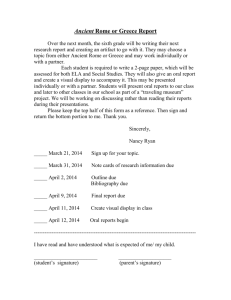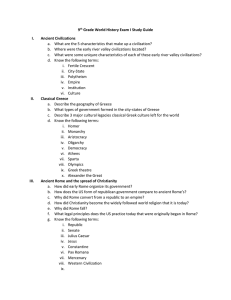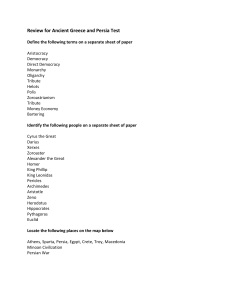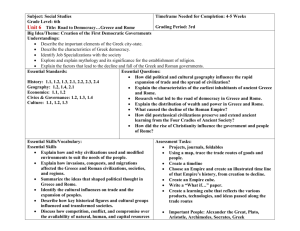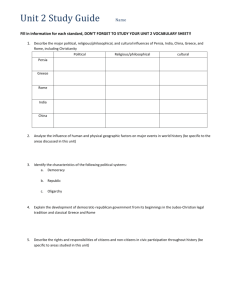Week 5 Lesson Plan
advertisement
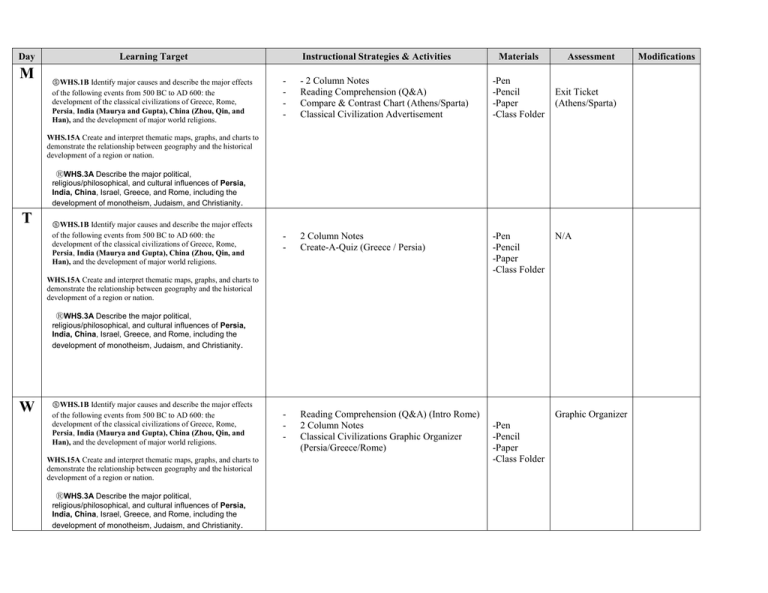
Day M Learning Target ⓈWHS.1B Identify major causes and describe the major effects of the following events from 500 BC to AD 600: the development of the classical civilizations of Greece, Rome, Persia, India (Maurya and Gupta), China (Zhou, Qin, and Han), and the development of major world religions. Instructional Strategies & Activities Materials - - 2 Column Notes Reading Comprehension (Q&A) Compare & Contrast Chart (Athens/Sparta) Classical Civilization Advertisement -Pen -Pencil -Paper -Class Folder - 2 Column Notes Create-A-Quiz (Greece / Persia) -Pen -Pencil -Paper -Class Folder - Reading Comprehension (Q&A) (Intro Rome) 2 Column Notes Classical Civilizations Graphic Organizer (Persia/Greece/Rome) Assessment Exit Ticket (Athens/Sparta) WHS.15A Create and interpret thematic maps, graphs, and charts to demonstrate the relationship between geography and the historical development of a region or nation. ⓇWHS.3A Describe the major political, religious/philosophical, and cultural influences of Persia, India, China, Israel, Greece, and Rome, including the development of monotheism, Judaism, and Christianity. T ⓈWHS.1B Identify major causes and describe the major effects of the following events from 500 BC to AD 600: the development of the classical civilizations of Greece, Rome, Persia, India (Maurya and Gupta), China (Zhou, Qin, and Han), and the development of major world religions. N/A WHS.15A Create and interpret thematic maps, graphs, and charts to demonstrate the relationship between geography and the historical development of a region or nation. ⓇWHS.3A Describe the major political, religious/philosophical, and cultural influences of Persia, India, China, Israel, Greece, and Rome, including the development of monotheism, Judaism, and Christianity. W ⓈWHS.1B Identify major causes and describe the major effects of the following events from 500 BC to AD 600: the development of the classical civilizations of Greece, Rome, Persia, India (Maurya and Gupta), China (Zhou, Qin, and Han), and the development of major world religions. WHS.15A Create and interpret thematic maps, graphs, and charts to demonstrate the relationship between geography and the historical development of a region or nation. ⓇWHS.3A Describe the major political, religious/philosophical, and cultural influences of Persia, India, China, Israel, Greece, and Rome, including the development of monotheism, Judaism, and Christianity. Graphic Organizer -Pen -Pencil -Paper -Class Folder Modifications Th ⓈWHS.1B Identify major causes and describe the major effects of the following events from 500 BC to AD 600: the development of the classical civilizations of Greece, Rome, Persia, India (Maurya and Gupta), China (Zhou, Qin, and Han), and the development of major world religions. - Reading Comprehension (Q&A) (Intro Rome) 2 Column Notes Classical Civilizations Graphic Organizer (Persia/Greece/Rome) - Create a Classical Civilization Timeline (Persia/Greece/Rome) WHS.15A Create and interpret thematic maps, graphs, and charts to demonstrate the relationship between geography and the historical development of a region or nation. -Pen -Pencil -Paper -Class Folder Graphic Organizer -Pen -Pencil -Paper -Class Folder Timeline ⓇWHS.3A Describe the major political, religious/philosophical, and cultural influences of Persia, India, China, Israel, Greece, and Rome, including the development of monotheism, Judaism, and Christianity. F ⓈWHS.1B Identify major causes and describe the major effects of the following events from 500 BC to AD 600: the development of the classical civilizations of Greece, Rome, Persia, India (Maurya and Gupta), China (Zhou, Qin, and Han), and the development of major world religions. WHS.15A Create and interpret thematic maps, graphs, and charts to demonstrate the relationship between geography and the historical development of a region or nation. ⓇWHS.3A Describe the major political, religious/philosophical, and cultural influences of Persia, India, China, Israel, Greece, and Rome, including the development of monotheism, Judaism, and Christianity. Teacher: J.Mason Subject: World History Week: 9/23/2013 – 9/27/2013 Room: S2 Float
